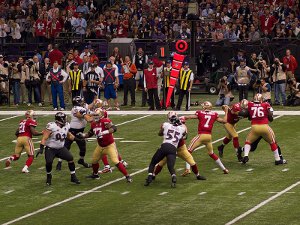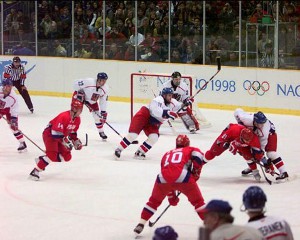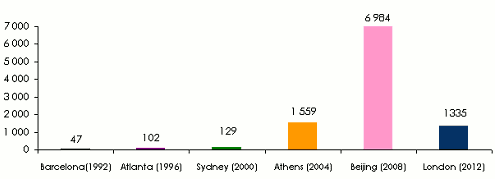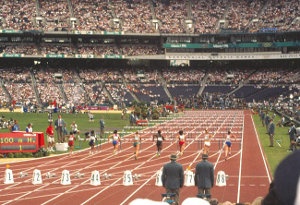Insurance of sporting events
 If ticketing was previously the main source of funding it gave way to broadcasting rights a long time ago. Sponsorship, another source of funding for sport, has become unavoidable, being currently associated with sports events, stadiums, teams and men.
If ticketing was previously the main source of funding it gave way to broadcasting rights a long time ago. Sponsorship, another source of funding for sport, has become unavoidable, being currently associated with sports events, stadiums, teams and men.
The world of professional sports has achieved its revolution in record time. The increasinglynotable commitment of a range of stakeholders including banks and insurers has greatly contributed to this move. The organization of sports events today requires multiple insurance coverages to protect all actors against the various hazards that make them quite vulnerable to heavy financial losses.
The experts of sporting events insurance
For many years, the Lloyd's market was the only one offering coverage for sporting events, thus earning solid reputation in the process. Today it still runs a significant portion of this business even though other insurers have set foot on this class of business since the 1990s, particularly in Europe and the United States. In Europe, Axa and Allianz are on all fronts likewise for the two leading global reinsurers Munich Re and Swiss Re who make available their enormous capacities.
Some brokers have also developed expertise in the field of sport like Marsh, Guy Carpenter, Aon, Gras Savoye, Henner Sports. To better serve their customers, these brokers often make recourse to former athletes to join their teams of consultants.
The more important the event is, the earlier the risk studies start. In the case of the Vancouver 2010 Olympic Games, Marsh began its risk analysis four years before the Dday. The broker then listed between 500 and 700 risks ranging from flooding to terrorism and epidemics.
Insurance of sporting events: Risk components
During the analysis of an athletic event-based risk like the Olympic Games, football World Cup, Tour de France, Formula 1 car race, underwriters give importance to the following criteria:
- The risk of TV picture interruption
- The nature of the event
- The kinds of sites where the event takes place
- Sports facilities
- The means and network of transport
- Organizers’ experience
- Events’ scheduling
- The safety of sports venues
- The political situation of the host country or countries
- The risk of boycott
- The risk of terrorism
- The risk of war
- Exposure to natural catastrophes
- The climate risk
1. The risk of TV picture interruption
 The evolution of audio-visual broadcasting rights for renowned sporting events is enough to give an idea of the tremendous development undergone by this sector. In constant dollars, comparing the 1960 Rome Olympics TV broadcasting rights costs of 1.2 million USD to those of the 2012 London Games amounting to 2.24 billion dollars, the amounts went 1900 fold.
The evolution of audio-visual broadcasting rights for renowned sporting events is enough to give an idea of the tremendous development undergone by this sector. In constant dollars, comparing the 1960 Rome Olympics TV broadcasting rights costs of 1.2 million USD to those of the 2012 London Games amounting to 2.24 billion dollars, the amounts went 1900 fold.
The environment through which various television channels broadcast images represents a major risk. The premises, the technology, the means available to broadcasters must be sophisticated enough to minimize failure or impaired transmission of images or sound. Because technical gear is not easy to transport, the occurrence of a problem could jeopardize all retransmissions.
Insurers’ analysis is therefore not limited only to the teams of the organizing committee, to television channels in charge, to staff experience, but also includes technical elements such as the way signals are transmitted and the kind of rescue systems available that can be utilized in case of interruption, failure, ...
2. The nature of the event
The risk profile of the football World Cup, world athletics championship or the Tour de France is different from the American Super bowl or a race of the Formula 1 championship. An interruption of a sporting event where only one game or one meeting is scheduled does not allow wireless media to provide a replacement game.
For events with more games like the Olympics, for example, the cancellation or postponement of a single competition or a meeting does not invalidate the entire show. Indeed, very few events can simultaneously affect all the places where the events occur or all players.
This exposure also depends on the duration of the sporting event which can last a few hours or a few weeks. The longer the exposure to risk is, the greater flexibility for organizers to come up with replacement solutions.
3. Kinds of sites where events take place
Directly related to the nature of the event, the number and kind of venues required for a given competition are among the criteria of the risk analysis.
In the case of a formula one race, or world athletic championship, the cancellation of the event is equivalent to a total loss for insurers unlike a World Cup football match. Because those matches take place in different places and stadiums, often away from each other, the risk of canceling the entire event is greatly reduced.
In addition, some sports can take place only on specific facilities. This is the case, for example, of bobsleigh, ski jumping, horse racing where any damage sustained by a site makes the game virtually impossible.
The age of the site also is a crucial matter. It should be modern enough to meet the standards of comfort and safety.
4. The sports facilities
 ports facilities including facilities for the media like the press, radio, television have to comply with all the requirements of thousands of journalists from around the world.
ports facilities including facilities for the media like the press, radio, television have to comply with all the requirements of thousands of journalists from around the world.
Athletes, officials and spectators must also be provided with nearby accommodation centers and restaurants. While some of these places can be interchangeable, others are not. Alternatives must still be provided in the event of fire, flood or other disaster affecting one of these places. Their expeditious implementation will prevent the full or the partial occurrence of the event.
5. The transport network
To allow a smooth course of competitions, a network of modern, dense and rapid transport system must be available to carry all the players throughout the different competition sites.
Special shuttles, in sufficient number must be made available to carry thousands of athletes and officials to the scene of the contests. Insurers will be keeping an eye on the traffic flow.
During the Olympic Games in Atlanta, some peaks were reached with 700 000 spectators and athletes transported per day. This influx required the presence of 1 932 buses, 218 vans and 2 300 chauffeur-driven cars.
The initial figures were underestimated, triggering major disruptions during the first days. An emergency plan was nevertheless provided with the requisition of school buses.
6. Organizers’ experience
The experience of the organizers is essential to risk assessment. Prestigious and complex events such as the Tour de France, the Olympics or the Super Bowl games require greater experience and sharper skills.
Specialized companies are hired to provide support and to better manage the entire organization.
7. Events' scheduling
 Events scheduling must take into account the possibility of major competitions postponement, this is the case of the Olympics, the various tennis tournaments (Roland Garros, Wimbledon).
Events scheduling must take into account the possibility of major competitions postponement, this is the case of the Olympics, the various tennis tournaments (Roland Garros, Wimbledon).
Major Ski downhill slaloms men and women are therefore scheduled at the beginning of games. A postponement of the latter event is not ruled out, in case of unforeseen circumstances.
In this case it would be useful to have the different competitions spread out over several locations At the Nagano Winter Games (Japan) in 1998, bad weather caused the postponement of many contests. Despite The heavy snowfall, no competition was cancelled because of the dispersion of games over several sites.
8. Safety of sports venues
In this field, several factors are to be taken into consideration:
- Police staff provided to secure the event
- The reputation of local police
- The availability of private security companies
- Tele-monitoring systems
- Restriction areas to ensure the safety of athletes
- Organizers’ experience in safety
As competitions are held in vast areas or in remote locations, controlling these areas might be a challenge.
Some places are easier to secure than others. It was, therefore, easier to ensure the public and athletes’ safety in Nagano (Winter Olympics 1998) and Albertville (1992 Winter Olympics) or the Montreal Grand Prix than the soccer World Cup which took place in major cities of South Africa (2010) or during the summer Olympics in London (2012).
For example, the 2012 London Olympics required the mobilization of:
- Two Navy warships, including a helicopter carrier
- 41 700 men ensuring security, 13 500 of whom are soldiers and 12 000 policemen
- Several fighter planes
- A battery of ground-to-air missiles.
9. The political situation in the host country or countries
Major sporting events are held, in general, in countries where the political situation is considered stable so that no event, strike or riot disrupts the competitions.
In 1988, during the Seoul Games, the student protests had raised concerns. The strength and influence of trade unions may impact the smooth occurrence of the events and cause losses for the insurer.
Security cost of the Olympic Games from 1992 to 2012
in millions USD
10. The risk of boycott
When awarding of television broadcasting rights for the Olympic Games, the presence of at least six countries in the top ten having won medals at the previous competition is generally guaranteed. These key countries (United States, Russia, Jamaica, China, etc.) boost TV rating for television channels.
Such a risk, excluded in the past, has been reinstated in the insurance policies at the Moscow Olympics in 1980. The boycott by the United States and 50 other countries of the Moscow Olympic Games resulted in significant losses to the TV channels.
The American channel NBC, which had then bought the broadcasting rights for an amount of 87 million USD, had to give up the broadcasting of competitions. It was nevertheless able to recover 90% of this amount through an insurance policy underwritten with the Lloyd's.
11. The risk of terrorism
Conflicts and political tensions that characterize the world nowadays have turned terrorism into a major risk. The 1972 Munich Games shall always be remembered by all insurers and organizers.
More recently, criminal explosions at the Atlanta Olympics in 1996 (2 dead and 112 wounded), and at the Boston Marathon in April 2013 (3 dead and 264 wounded) are sharp reminders that the terrorism threat is present and security measures, however tight and draconian, cannot guarantee zero risk.
Planetary events (Soccer World Cup, the Summer Olympics) are the focus of all fears. Given the extensive media coverage, an attack during these competitions would be relayed around the world.
The Olympic Games are more vulnerable to terrorist attacks than Soccer World Cup. Access to the sites of certain sports such as the marathon, cycling races, sailing, etc. is much easier than that of events taking place indoors.
To assess the risk of terrorism, insurers consider the political risk posed by the host country, the nations represented, the popularity of the competition, the level of security, the experience of authorities involved, the budget devoted to security, the capacity of the police and armed forces, the physical setting of sports sites, ...
12. The risk of war
The apprehension of war risk depends on the definition given to it. The cancellation of the event can take place in case of war in the same country or in neighboring countries making the arrival of athletes risky.
Being difficult to assess several years in advance, the risk of war is generally insured a few months before the start of the competition.
Political events
| Date | Event | Place | Victims | Other details |
|---|---|---|---|---|
05/09/1972 | Olympic Games | Munich (Germany) | 17 dead | Hostage |
27/07/1996 | Olympic Games | Atlanta (United-States) | 2 dead, 112 injured | Bomb explosion |
17/05/2006 | Preparation for the Turin Olympics | Iraq | 2 dead, 15 lost | Murders, Kidnapping |
09/04/2008 | Marathon | Colombo (Sri Lanka) | 13 dead,100 injured | Suicide attack |
03/03/2009 | Cricket match | Lahore (Pakistan) | 8 dead, 6 injured | Shooting |
08/01/2010 | African Cup of Nations | Cabinda (Angola) | 3 dead, 2 injured | Attack of the Togo team bus |
15/04/2013 | Boston Marathon | Boston (United-States) | 3 dead, 264 injured | Explosion of two bombs |
13. Exposure to natural catastrophes
The risk of natural catastrophe is meticulously examined. Models are used to estimate earthquake, floods or storm risks.
An event that takes place in a single location is more likely to be affected by an outright cancellation if a natural catastrophe occurs shortly before the opening of the competition. If the event is scattered around several parts of the country, postponement may be considered for some competitions, and disruption is only partial.
14. The climate risk
Rarely does weather forecast push organizers to cancel sporting events definitively. For events taking place in summer, rain, wind, storms and hail can cause delays.
In winter, the impact of weather disturbance may be more important. The 1998 Nagano Olympics bear witness of those difficulties. The games were painfully completed after heavy snowfalls, which triggered important financial costs.
Premium calculation
 All these risks have demonstrated that each sport's event results in a customized contract whose retained guarantees define premium amount. Major risks remain weather, natural catastrophes, terrorism and political risks.
All these risks have demonstrated that each sport's event results in a customized contract whose retained guarantees define premium amount. Major risks remain weather, natural catastrophes, terrorism and political risks.
Local Olympic Games organizers are generally entities established for the duration of the competition which will normally be terminated at the end of games. The guarantees wanted refer to the total and partial cancellation of the sport's event, to the shifting of the location of meetings or their postponement.
FIFA (International Federation of Football Association), FAI (Football Association of Ireland), ... are permanent organizations with different needs. In the past, the world cup football was insured on the basis of total capital at risk.
Today sports events of this kind are mainly covered as excess of loss policy, whereby the total amount is not covered. Premium calculation introduces payback concepts specific to non-proportional reinsurance. A 10-year insurance policy was written to cover the Olympics from 2000 to 2008 with a premium rate identical to summer and winter games.
Fatal motor accidents of «Formula 1»
| Date | Event | Circuit | Place | Victims | Other details |
|---|---|---|---|---|---|
21/06/1970 | GPA Netherlands | Zandvoort | Netherlands | Piers Courage | Race |
05/09/1970 | GPA Italy | Monza | Italy | Jochen Rindt | Qualifications |
24/10/1971 | Brands Hatch Victory | Brands Hatch | United Kingdom | Jo Siffert | Race |
29/07/1973 | GPA Netherlands | Zandvoort | Netherlands | Roger Williamson | Race |
06/10/1973 | GPA United-States | Watkins Glen International | United States | François Cevert | Qualifications |
06/10/1974 | GPA United-States | Watkins Glen International | United States | Helmut Koinigg | Race |
05/03/1977 | GPA South Africa | Kyalami | South Africa | Tom Pryce | Race |
11/09/1978 | GPA Italy | Monza | Italy | Ronnie Peterson | Race |
08/05/1982 | GPA Belgium | Zolder | Belgium | Gilles Villeneuve | Qualifications |
13/06/1982 | GPA Canada | Gilles-Villeneuve | Canada | Riccardo Paletti | Race |
30/04/1994 | GPA San Marino | Enzo e Dino Ferrari | San Marino | Roland Ratzenberger | Qualifications |
01/05/1994 | GPA San Marino | Enzo e Dino Ferrari | San Marino | Ayrton Senna | Race |
GPA: Grand Prix motor race
Insurance of sporting events : Main covers
Major insurance guarantees provided to various participants in sports events.
Customized solutions
- Third party liability
- Life insurance
- Cancellation, interruption of a sports event
- Damage to property
Specific covers
- Absence of a star athlete
- Adverse weather conditions
- Personal accident and loss of profession
- Game bonuses and bonuses paid to players
- Grants and awards given during sports competitions
- Advertising returns, promotional operations
Insurance of sporting events : Covers for sponsors
- Quote indemnity insurance
- Conditional rebate insurance
- Advertising cancellation insurance
- Advertising returns insurance
- Accidental death and disability insurance, reputation protection insurance
Insurance of sporting events : Motor sport coverage
- Cancellation insurance for a single sports event
- Insurance for TV broadcasting interruption
- Liability insurance for organizers
- Comprehensive insurance for sports venues
- Legal protection insurance
Insurance of sporting events : Covers for athletes and clubs
- Athletes’ disability Insurance
- Loss of earnings insurance / transfer insurance
- Market value coverage
- No show insurance
- Additional cost insurance
- Health and accident insurance
Insurance of sporting events : Covers for organizers
- Insurance for the cancellation of an event
- Insurance for TV broadcasting interruption
- Liability insurance for organizers
- Comprehensive insurance for sports venues
- Legal protection insurance for organizers
Insurance of sporting events : Covers for television channels and film producers
- Insurance for picture, sound and data carriers
- Insurance of production props and gear
- Insurance for film production liability
- No show insurance
- No object insurance
- Gear insurance
- Fund insurance
The Paris-Dakar Rally: fatal motor accidents
| Date of event | Victims |
|---|---|
1979 | 1 Dead |
1981 | 3 Dead |
1982 | 3 Dead |
1983 | 1 Dead |
1984 | 1 Dead |
1985 | 1 Dead |
1986 | 6 Dead |
1987 | 1 Dead |
1988 | 8 Dead |
1990 | 1 Dead |
1991 | 1 Dead |
1992 | 3 Dead |
1994 | 2 Dead |
1996 | 2 Dead |
1997 | 1 Dead |
1998 | 6 Dead |
1999 | 1 Dead |
2001 | 1 Dead |
2002 | 1 Dead |
2003 | 1 Dead |
2005 | 5 Dead |
2006 | 3 Dead |
2007 | 2 Dead |
2009 | 3 Dead |
2010 | 1 Dead, 5 injured |
2011 | 3 Deads, 2 injured |
2012 | 1 Dead |
2013 | 3 Dead, 7 injured |
Total | 53 Dead |
Since its inception in 1979, the Paris-Dakar rally has claimed the lives of 53 people.
Thierry Sabine, founder of the event (died 1986), and Daniel Balavoine, French singer (died in 1986), were among the victims.